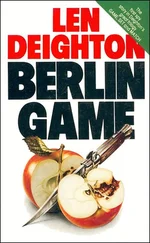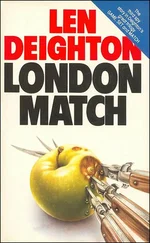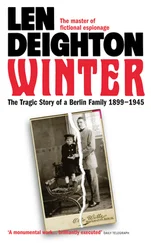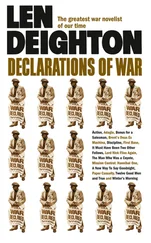Len Deighton - XPD
Здесь есть возможность читать онлайн «Len Deighton - XPD» — ознакомительный отрывок электронной книги совершенно бесплатно, а после прочтения отрывка купить полную версию. В некоторых случаях можно слушать аудио, скачать через торрент в формате fb2 и присутствует краткое содержание. Жанр: Триллер, на английском языке. Описание произведения, (предисловие) а так же отзывы посетителей доступны на портале библиотеки ЛибКат.
- Название:XPD
- Автор:
- Жанр:
- Год:неизвестен
- ISBN:нет данных
- Рейтинг книги:4 / 5. Голосов: 1
-
Избранное:Добавить в избранное
- Отзывы:
-
Ваша оценка:
- 80
- 1
- 2
- 3
- 4
- 5
XPD: краткое содержание, описание и аннотация
Предлагаем к чтению аннотацию, описание, краткое содержание или предисловие (зависит от того, что написал сам автор книги «XPD»). Если вы не нашли необходимую информацию о книге — напишите в комментариях, мы постараемся отыскать её.
XPD — читать онлайн ознакомительный отрывок
Ниже представлен текст книги, разбитый по страницам. Система сохранения места последней прочитанной страницы, позволяет с удобством читать онлайн бесплатно книгу «XPD», без необходимости каждый раз заново искать на чём Вы остановились. Поставьте закладку, и сможете в любой момент перейти на страницу, на которой закончили чтение.
Интервал:
Закладка:
‘Publicity and controversy leading on to speeches and demonstrations. Neo-Nazis fighting left-wingers in the streets. Once it started there is no telling where it might have ended.’
‘Especially with General Shumuk pulling the strings,’ said Stuart, but Kleiber had never heard of Shumuk and did not respond to this remark.
‘We Germans are like that,’ said Kleiber. ‘We’re always too anxious to please the people who conquer us. We flatter them and imitate them. Split down the centre, we now have two halves each trying slavishly to adopt the system, myth and methodology of our masters. But Böttger knew that West Germany needs the untarnished memory of Churchill and Roosevelt in a way that the other western countries don’t need them. Moscow Centre thought Böttger might be right and judging from the effort your people put into it, London did too.’ He smiled, and drank more whisky.
Stuart said, ‘They thought it might be a blow to the value of sterling on the international exchanges. It doesn’t need much to start a run. They worried about the psychological effect the idea of Churchill’s asking for peace would have on American public opinion. Here in the US, most anglophilia depends on Churchill’s wartime reputation as a man who never considered giving up the struggle. My people worried too about public opinion in those countries which Churchill was prepared to consign to the Nazi empire. Some of those countries now sell Britain oil and vital raw materials. There was plenty to worry about.’
At the sound of conversation outside, Kleiber got to his feet and went to the window. He looked across the pool to the units where two men in white coats were going to examine Grechko’s body. He watched them enter the door and then turned back to Stuart. ‘I was there,’ he said suddenly. ‘You know that, don’t you?’
‘I guessed,’ said Stuart. ‘I got your army service record. You were attached to the Führerhauptquartier for roughly the period of the Churchill visit. You were an intelligence officer: I guessed it was an attachment for security purposes, for the summit meeting.’
Kleiber looked at him. The British were like that. He never knew quite where he was with them, but they didn’t frighten him in the way the CIA men did.
‘I went out to the site with Dr Todt and the survey team. Before they even started on it.’
‘It was built specially for the Churchill meetings?’
‘Sure. It wasn’t much of a place. It’s still there. A couple of years ago I stopped off and had coffee at the hotel there. It’s not much changed: a church, a hotel and a few houses… a concrete bunker, plus a few wooden huts. Wolfschlucht , Hitler named it.’
‘So you were there before Churchill arrived?’
‘I helped arrange the new passes and the perimeter and so forth. It was a small party that arrived. No military attachés or war correspondents, no one in civilian clothing at all. It was obviously something very unusual. We were told only that it was to be a conference, and thought Mussolini was coming north. I suppose that’s what we were intended to think.’
‘But it was Churchill.’
‘He was the only one in civilian clothes. He wore a misshapen, grey rollbrim hat, a spotted bow-tie and a lumpy looking overcoat. His plane had no markings as I recall. We saw ten Messerschmitt fighters in loose formation above Churchill’s de Havilland when it arrived. They continued to circle while he landed at Le Gros Caillou, near Rocroi in France, about ten kilometres from us. They brought him up to Brûly in a Fiesler Storch communications aircraft. There was just room to land in the field behind the hotel.’
‘Churchill was alone?’
‘There was one person with him, a British colonel in civilian clothes. The Führer had a small guard of honour made up from the SS Begleit Kommando and the army’s FBB. Churchill was invited to inspect them but he waved the guard commander away. The two leaders went directly to the wooden hut where the secretaries and translators were waiting. The Führer greeted Churchill at the door of it; the two men did not shake hands. I got the idea that Churchill was making sure that there were no photographers there. He had stipulated that beforehand. We had special instructions to confiscate all cameras from everyone, and there were notices in the barrack huts threatening the death sentence for anyone not handing his camera over to the security service.’
‘So who was present at the meeting?’
‘Hitler, Churchill, Churchill’s colonel, our translator from the Foreign Office… ’ Kleiber scratched his head. ‘That’s all, I think. Nearby there were secretaries and two more translators waiting in case they were needed.’
‘So who wrote up the Hitler Minutes?’
Kleiber smiled. ‘Reichsführer Himmler had a bureaucratic turn of mind. He persuaded the Führer that some proper record of the proceedings must be made. The Führer was nervous about compromising the talks and eventually Himmler took it upon himself to rig an underground line and a hidden microphone so that one of the army’s shorthand writers could keep a record of what was said.’
‘Who was that?’
‘You’ve guessed already, haven’t you?’ said Kleiber. ‘It was Franz Wever. The Führer used him many times for keeping shorthand notes of important meetings. He was one of the best shorthand writers they had.’
‘Franz Wever.’ So Wever had known who Reichsbank Director Frank really was.
‘He even denied it to me. That’s funny, isn’t it? He denied it to me: the man who helped to rig the cable to the hut where he was sitting. Franz was terrified that someone would find out about it. He was frightened that he’d be murdered on account of his secret.’
‘And eventually he was murdered because of it.’
Kleiber pulled a face and seemed about to argue the facts but decided against it. Franz Wever’s death was not a subject he wished to discuss with a member of the British Secret Intelligence Service.
‘Hitler was clever,’ he said. ‘He knew how to be modest and magnanimous. Instead of adopting the manner of the conqueror he was quiet spoken and polite to Churchill. He was a wonderful judge of character, you see. He knew he’d get far more out of Churchill if he behaved like an English gentleman in the presence of another such “lord”.’
‘But Hitler’s terms were tough. You must have read the transcript.’
‘Considering the situation, no. He admired the British Empire but he envied it too. His first concern was to make the German war machine entirely independent in terms of raw materials-rubber, oil, tungsten, chrome and so on. He was obviously planning to attack the USSR once the west was resolved.’
‘You mean he would have taken over British colonies?’
‘He said the Union Jack would continue to fly everywhere from Vancouver to Calcutta to Hong Kong but he wanted his trading links secured. A large proportion of the British merchant fleet would have come under German control. Hitler had drafted some ideas about that. Then of course there was the Royal Navy. Germany could not have permitted Britain to retain control of the Atlantic sea routes; it would have been like offering Churchill a chance to have his hands round our throat.’
‘Occupation of Britain?’
‘No. Just a few Germans in sensitive posts. Himmler to vet all senior police appointments. It would have given us enough control, or at least warning in time to counteract trouble.’
‘There was no shouting?’
‘No shouting at all. The summit went off remarkably well. The second meeting was very late-after midnight-and then there was the final meeting on the morning of Wednesday, June 12. That was even more promising. Churchill and the Führer even shook hands. There were some muttered cheers. Churchill was smoking a cigar and smiling… To be allowed to smoke a cigar in the presence of the Führer-this was something unprecedented. We were all sure that the peace had been arranged. At least until the following Sunday.’
Читать дальшеИнтервал:
Закладка:
Похожие книги на «XPD»
Представляем Вашему вниманию похожие книги на «XPD» списком для выбора. Мы отобрали схожую по названию и смыслу литературу в надежде предоставить читателям больше вариантов отыскать новые, интересные, ещё непрочитанные произведения.
Обсуждение, отзывы о книге «XPD» и просто собственные мнения читателей. Оставьте ваши комментарии, напишите, что Вы думаете о произведении, его смысле или главных героях. Укажите что конкретно понравилось, а что нет, и почему Вы так считаете.












